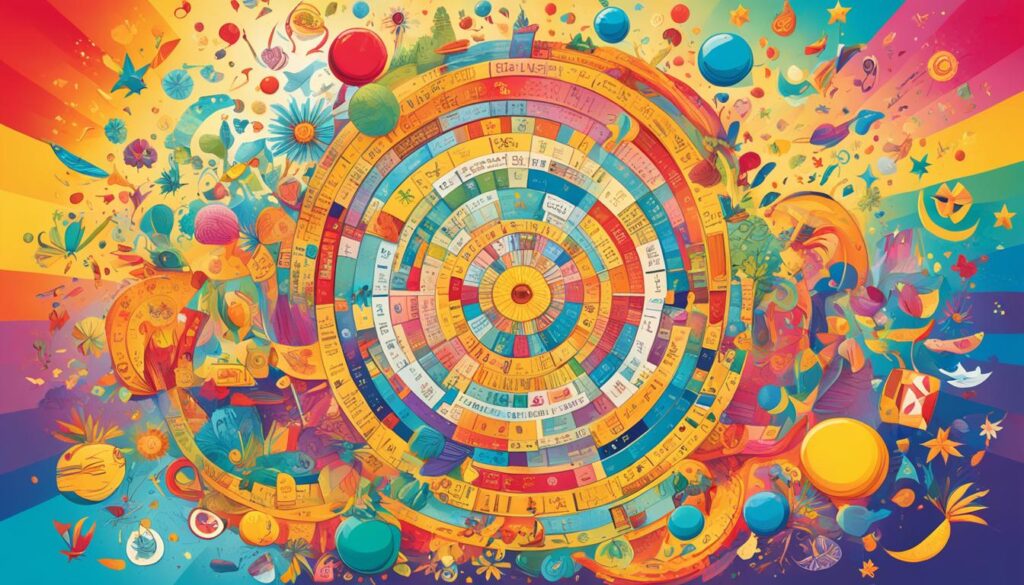In the pursuit of happiness, it can sometimes feel like there’s a secret society that has all the answers. But what if there was a way to uncover that happiness without upending your life? In this article, we’ll delve into essential happiness questions that will inspire self-reflection and guide you on your journey to lasting joy. We’ll explore the meaning of happiness, the science behind it, and practical steps you can take to find your own happiness. So, let’s cut through the noise and embark on this journey together.
As Buddha wisely said, “Thousands of candles can be lit from a single candle, and the life of the candle will not be shortened. Happiness never decreases by being shared.” This quote reminds us that happiness isn’t a limited resource, but something that can be multiplied and shared.
Key Takeaways:
- Uncover essential happiness questions to inspire self-reflection.
- Explore the meaning of happiness and the science behind it.
- Discover practical steps to find your own lasting joy.
- Remember that happiness grows when shared with others.
- Embark on this journey to unlock the joy that awaits you.
What is Happiness? Defining the Key to Joy
Achieving true happiness is a cherished goal for many. But what exactly is happiness? According to Merriam-Webster, happiness is a state of well-being, contentment, and joy. However, the concept of happiness varies across different cultures and philosophies. It’s important to consider these various perspectives to gain a comprehensive understanding of happiness.
In Buddhism, happiness is found in the practice of mindfulness, compassion, and addressing modern challenges. Mindfulness allows us to fully experience the present moment, while compassion enables us to connect with others and bring joy to their lives. By addressing modern challenges, we can find happiness by contributing to positive change in the world.
Ultimately, happiness comes from love, unity, and a sense of meaning in life. Love offers fulfillment and connection, while unity fosters a sense of belonging and support. Finding meaning in life gives us a sense of purpose and direction, allowing us to lead fulfilling and joyful lives.
Understanding the different perspectives on happiness can help us redefine our own notion of what it means to be truly happy. By reflecting on these diverse interpretations, we can incorporate elements from different philosophies and cultures into our own pursuit of happiness, leading to a more fulfilling and joyous life.

The Pursuit of Happiness
The quest for happiness is a deeply personal journey. It involves self-reflection, introspection, and a willingness to explore our values and desires. By seeking happiness, we actively engage in our own personal growth and well-being.
Research on happiness helps us unravel the complexities of this elusive emotion. Scientists have conducted extensive studies to understand the factors that contribute to happiness and well-being. Their findings can provide valuable insights and practical techniques that we can incorporate into our lives to increase our overall happiness.
So, embrace the journey towards happiness, reflect on the different perspectives, and unlock the key to lasting joy in your life.
The Science Behind Happiness: The Duchenne Smile
In 1862, the French anatomist Duchenne de Boulogne made a groundbreaking discovery that unveiled the connection between specific facial muscles and true joy. This discovery led to the identification of a smile known as the Duchenne smile, characterized by the activation of the cheek and eye muscles.
Want to experience the power of the Duchenne smile for yourself? Try this simple exercise: hold a pencil between your teeth to simulate the activation of the muscles involved in a genuine smile. Although it may feel forced at first, this exercise can send signals to your brain that trigger a sense of happiness. Over time, these signals can result in reduced stress levels and overall increased well-being.
Understanding the science behind happiness empowers us to utilize exercises like the Duchenne smile to boost our own happiness. By incorporating these techniques into our daily routine, we can cultivate a positive mindset and enhance our overall well-being.
To further illustrate the impact of the Duchenne smile, here is a table showcasing the potential benefits:
| Benefits of the Duchenne Smile | |
|---|---|
| Decreased stress levels | Smiling triggers the release of endorphins, which are natural stress-relieving hormones. |
| Improved mood | The act of smiling, even artificially, can elevate mood and promote positive emotions. |
| Enhanced social interactions | Smiling is contagious. Displaying a genuine smile can create a positive and welcoming atmosphere in social situations. |
| Increased resilience | Regularly practicing the Duchenne smile exercise can help strengthen emotional resilience, allowing for better coping and adaptation to challenges. |
By incorporating the Duchenne smile exercise and other happiness techniques into our daily lives, we can lay the foundation for a happier and more fulfilling existence.

Happiness Across Cultures: From Ancient Wisdom to Modern Perspectives
Happiness is a universal concept that transcends cultural boundaries. However, the interpretation of happiness can vary significantly across different cultures. Exploring the cultural perspectives on happiness can offer valuable insights and tips to enhance your own pursuit of joy.
In ancient China, happiness was seen as being fortunate and free from obstacles. Chinese texts from centuries ago emphasized the importance of luck and external circumstances in achieving happiness. This perspective suggests that happiness is largely dependent on external factors beyond our control.

Greek philosophers, on the other hand, viewed happiness as a state of eudaimonia, which encompassed well-being and virtuous living. According to these philosophers, true happiness is achieved through personal growth, self-reflection, and living a life aligned with one’s values and virtues.
In the modern era, the pursuit of happiness has shifted towards personal responsibility and autonomy. With increasing individualism, people are encouraged to take charge of their own happiness and make choices that align with their own desires and goals.
Understanding the different cultural perspectives on happiness can help you broaden your own understanding of what brings you joy. By embracing diverse viewpoints, you can incorporate elements from different cultures into your own pursuit of happiness and discover new strategies and practices to enhance your well-being.
A Comparison of Cultural Perspectives on Happiness
| Chinese Perspective | Greek Perspective | Modern Perspective |
|---|---|---|
| Emphasizes luck and external circumstances | Focuses on personal growth and virtuous living | Promotes personal responsibility and autonomy |
| Suggests happiness is beyond individual control | Encourages self-reflection and alignment with values | Empowers individuals to pursue happiness on their own terms |
| Highlights the importance of fortune and obstacles | Values well-being and living a virtuous life | Recognizes the significance of personal choice and fulfillment |
By considering these diverse perspectives, you can assess your own happiness in a more holistic manner. Reflect on what aspects of happiness resonate with you the most and incorporate practices from different cultures that align with your values and beliefs.
Remember, happiness is a personal journey, and there is no one-size-fits-all approach. Embrace the wisdom of ancient cultures and combine it with contemporary insights to create a unique path to happiness that reflects your own values and aspirations.
Your Happiness Portfolio: Investing in the Four Pillars of Joy
In your pursuit of happiness, it’s essential to understand that it’s not just a single aspect of life that contributes to your overall well-being. Happiness is like an investment portfolio, with different pillars that work together to bring you joy and fulfillment.
These four pillars of joy are:
- Faith or Life Philosophy: Having a set of beliefs or a life philosophy that resonates with you can give you a sense of purpose and guide your actions. Whether it’s through religion, spirituality, or a personal belief system, having faith in something greater than yourself can provide comfort, strength, and direction.
- Family: Your family, whether biological or chosen, plays a significant role in your happiness. They provide support, love, and a sense of belonging. Investing time and effort into nurturing and maintaining strong family relationships can bring immense joy and stability to your life.
- Friendships and Community: Friendships and community connections add depth and richness to your life. Surrounding yourself with positive, supportive, and like-minded individuals can foster a sense of belonging and social connection. Investing in these relationships by spending quality time together, being there for one another, and participating in community activities can greatly enhance your well-being.
- Meaningful Work: Having work that aligns with your values, interests, and passions can bring a tremendous sense of fulfillment and purpose. It’s not just about financial success but finding work that gives you a sense of contribution, personal growth, and accomplishment. Investing in a career or pursuing hobbies that bring you joy can elevate your happiness levels.
Reflect on each of these pillars and assess where you currently stand in each area. Consider the time and energy you allocate to each pillar and whether it aligns with your values and priorities. Identify any areas where you may need to invest more time and effort to strengthen that aspect of your happiness portfolio.
Remember, achieving a balance between these pillars is crucial. Neglecting one area can have a ripple effect on the others. By investing in each of these pillars and nurturing their growth, you can build a strong foundation for long-lasting happiness and fulfillment.
Your Happiness Inventory: Answering the Key Questions
In order to truly understand and assess our own happiness, it’s important to embark on a journey of self-reflection. By asking ourselves key questions and reflecting on our responses, we can gain valuable insights into what brings us joy and fulfillment. Consider these essential questions to help unlock a deeper understanding of your own happiness:
- What is the meaning of life for you?
Contemplate the values, beliefs, and purpose that give your life meaning and significance. This question can help you identify the core principles and priorities that guide your decisions and actions. - Who do you consider as your family?
Family extends beyond biological connections. Reflect on the relationships that form your support system, whether they are blood relatives, close friends, or chosen family. Recognize the people who provide love, care, and a sense of belonging in your life. - Where do you find a sense of community?
Community plays a vital role in our happiness. Consider the groups, organizations, or environments where you feel a sense of connection, shared values, and a space for growth. This can include your workplace, religious or spiritual groups, neighborhood associations, or hobby clubs. - What work do you find meaningful?
Reflect on the activities, projects, or tasks that bring you a sense of purpose and fulfillment. This can involve both professional and personal pursuits. Identify the aspects of your work that align with your values and contribute positively to the world around you.
By answering these key questions and contemplating how your responses align with your current reality, you can gain valuable insights into areas where you may need to make changes or adjustments to increase your overall happiness. Self-reflection is a powerful tool for personal growth and happiness assessment. Remember, your happiness journey is unique to you, and taking the time to explore these questions will help you navigate towards a life filled with joy and fulfillment.

| Question | Reflection |
|---|---|
| What is the meaning of life for you? | [Your reflection] |
| Who do you consider as your family? | [Your reflection] |
| Where do you find a sense of community? | [Your reflection] |
| What work do you find meaningful? | [Your reflection] |
Unlocking the Equation: Enjoyment + Satisfaction + Meaning
Happiness is often described as a combination of enjoyment, satisfaction, and meaning. When these three elements come together, they create a strong foundation for lasting happiness and fulfillment. Let’s explore each component in detail:
1. Enjoyment
Enjoyment goes beyond momentary pleasure; it encompasses activities and experiences that bring you joy and a sense of fulfillment. It involves embracing hobbies, pursuing passions, and engaging in activities that resonate with your values and interests. By prioritizing enjoyment in your life, you can cultivate a deep sense of happiness and personal growth.
2. Satisfaction
Satisfaction is about finding contentment with what you have and who you are, rather than constantly striving for more. It involves practicing gratitude, acknowledging your accomplishments, and appreciating the present moment. By cultivating satisfaction, you can develop a sense of peace and stability, enhancing your overall well-being.
3. Meaning
Meaning is an essential component of happiness; it gives your life purpose and direction. Finding meaning involves identifying your values, connecting with something greater than yourself, and making a positive impact on others. It provides a sense of fulfillment and helps you navigate challenges with resilience and determination.
By understanding and nurturing these three elements – enjoyment, satisfaction, and meaning – you can unlock the equation for a truly fulfilling and joyful life. They work together harmoniously, creating a holistic approach to happiness. Now, let’s take a look at a table that summarizes the key aspects of enjoyment, satisfaction, and meaning:
| Aspect | Definition | Practices |
|---|---|---|
| Enjoyment | Experiencing joy and fulfillment through activities and experiences aligned with your values and interests. |
|
| Satisfaction | Finding contentment with what you have and who you are, rather than constantly seeking more. |
|
| Meaning | Discovering a sense of purpose and connection through values, contribution, and making a difference. |
|
Understanding and embracing these aspects can transform your perspective on happiness. Now that we’ve explored the equation of enjoyment, satisfaction, and meaning, let’s move forward and delve deeper into the fascinating world of happiness assessment and research.
Conclusion
Happiness is not a destination but a journey. It requires self-reflection, a willingness to embrace new perspectives, and a commitment to personal growth. By exploring essential happiness questions, you can uncover insights into what truly brings you joy and take practical steps to cultivate happiness in your life.
So, let’s embark on this journey together and unlock the joy that awaits you. Remember, your happiness is unique to you, and it’s worth pursuing with passion and intention.
As you continue on your path to happiness, here are some tips and exercises to incorporate into your daily life:
- Practice gratitude by writing down three things you’re grateful for each day.
- Engage in regular physical exercise to release endorphins and boost your mood.
- Cultivate mindfulness through meditation or breathing exercises to enhance your awareness and bring a sense of calm.
- Connect with loved ones, friends, and your community to foster meaningful relationships and a sense of belonging.
- Set goals that align with your values and pursue them with determination and purpose.
Remember, happiness is within your reach. By incorporating these tips and exercises into your daily routine, you’ll be well on your way to cultivating a joyful and fulfilling life.

